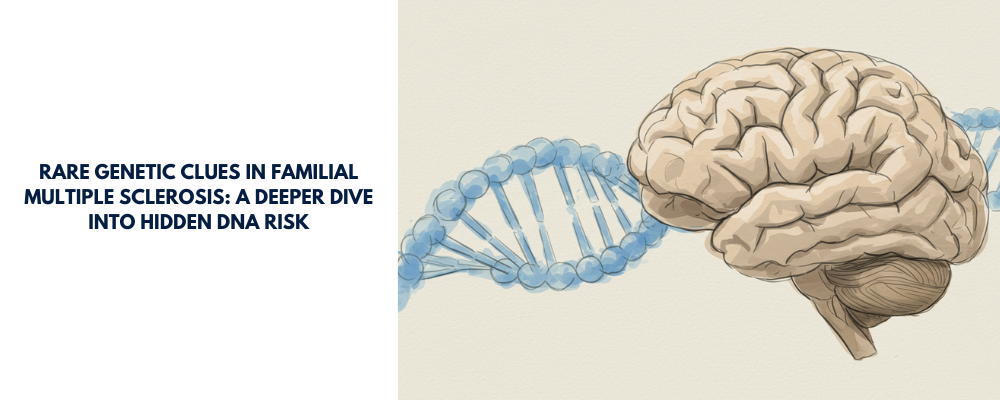
Multiple sclerosis (MS) is a complex immune-mediated disease that targets the central nervous system. Despite decades of research, many aspects of its development remain a mystery—especially why it tends to run in some families. While genome-wide association studies (GWAS) have mapped over 200 common genetic variants linked to MS, these explain only a fraction of its heritability.
That’s where this new study by Turk et al. (2025), published in Scientific Reports, enters the picture. The team set out to investigate a less-explored frontier: rare, potentially pathogenic (RPP) genetic variants in genes already known to be associated with MS via GWAS. Their focus was on comparing familial MS (FMS)—cases where MS runs in the family—with sporadic MS (SMS)—cases that seem to arise randomly.
The takeaway? Familial MS patients carry a significantly higher burden of rare genetic mutations in GWAS-linked genes than sporadic cases or healthy individuals. This finding could mark a shift in how we think about the genetic architecture of MS.
Study Design in a Nutshell
The researchers examined 4042 individuals from Slavic populations, divided into:
87 familial MS (FMS) patients (each with a first-degree relative also affected),
89 sporadic MS (SMS) patients (no known family history),
3866 control individuals with no MS diagnosis.
All participants underwent whole exome sequencing (WES)—a technique that reads the protein-coding regions of their DNA. The team focused on 111 GWAS-associated genes and filtered out only the rarest variants (frequency < 1%) that were predicted to be damaging.
What They Found: Rare Variants Tell a Big Story
The study’s main finding was striking:
FMS patients carried a significantly higher load of rare, potentially pathogenic variants in the selected MS-associated genes compared to controls (p-value: 5.27 × 10⁻⁷⁴).
SMS patients did not show a significant difference in these rare variants versus controls (p-value: 1.00).
This suggests that rare variants may be more important in inherited forms of MS, while common variants might play a bigger role in sporadic cases.
The Six Key Genes in Familial MS
Six genes stood out for being enriched with RPP variants in familial MS patients:
ALPK2 – Involved in cell signaling and possibly the WNT/β-catenin pathway, which regulates immune responses and myelination.
ANKRD55 – Previously linked to autoimmune diseases, including MS and rheumatoid arthritis.
INTS8 – A gene important for RNA processing and brain development; also affects the TGF-β pathway, known to be dysregulated in MS.
IQCB1 – Plays a role in immune checkpoint regulation and ciliary function.
JADE2 – Impacts neurogenesis and inflammation regulation through histone modification.
MALT1 – A key regulator of immune cell activation and inflammation, shown in animal models to reduce MS-like symptoms when inhibited.
Interestingly, many of these genes intersect with pathways already known to be involved in MS pathogenesis, such as immune dysregulation and neuronal integrity.
Why This Matters
The study offers solid evidence that rare genetic variants in familiar genes can strongly influence MS risk, particularly in familial cases. This supports the rare variant hypothesis—that in some complex diseases, it’s not just many small-effect common variants but also fewer large-effect rare variants that matter.
Additionally, it opens doors for:
New therapeutic targets, such as MALT1 inhibitors already tested in mouse models.
More accurate genetic risk profiling for individuals with a family history of MS.
A push for larger-scale studies to further validate these findings and explore gene-environment interactions.
Study Limitations: Worth Noting
As with all research, this study had a few limitations:
Only one MS patient per family was included, preventing detailed family-based genetic tracking.
The relatively small number of MS patients might miss some rare variants of moderate effect.
No functional lab studies were done to confirm the biological impact of the identified mutations.
Conclusion: Piecing Together the MS Genetic Puzzle
Turk et al.’s work adds a crucial piece to the complex MS puzzle. It doesn’t disprove the role of common variants, but rather complements it by highlighting that familial MS may have a distinct genetic architecture—one where rare variants play an outsized role.
As genetic sequencing becomes more accessible and data pools grow, studies like this will likely reshape how we diagnose, predict, and eventually treat diseases like MS. For now, it offers hope that the families affected by MS may someday benefit from more personalized, genetically informed interventions.
Reference:
Turk, A. et al. Increased burden of rare variants in GWAS associated genes in familial multiple sclerosis. Scientific Reports (2025).
